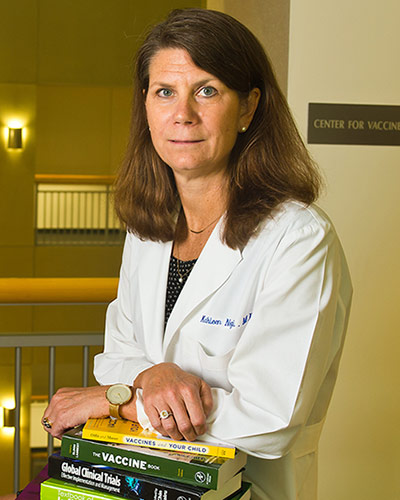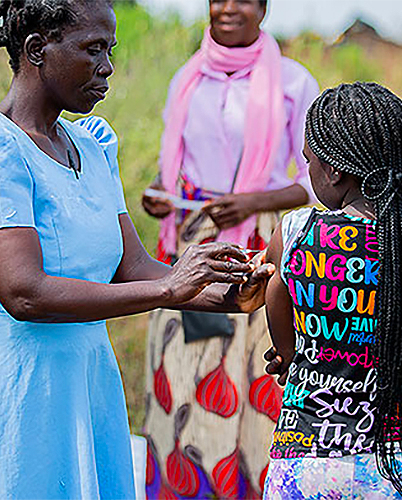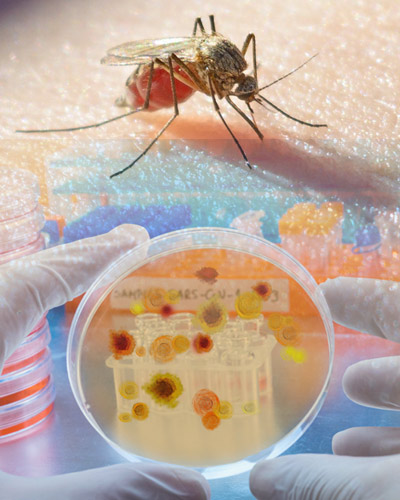April 05, 2023 | January Payne
Vaccine Technology Developed for COVID-19 Could Help Conquer Flu, Malaria and HIV

The huge success of mRNA vaccines to combat COVID-19 has opened up a new era in vaccine development, offering the potential for faster, more efficient, and more effective vaccine production. In an editorial commenting on a new study published last week in the New England Journal of Medicine (NEJM), Dr. Neuzil, who is also the Myron M. Levine, MD, Professor in Vaccinology at UMSOM, wrote, “the application of mRNA technology to influenza vaccines would permit the design of vaccines that incorporate mRNAs matched to multiple influenza strains, a rapid adaptive response to virus evolution, and the manufacture of combination vaccines that include influenza and noninfluenza proteins, which would facilitate delivery to populations.”
Dr. Neuzil pointed to more than 20 studies underway or in the planning stages to test novel influenza vaccines utilizing this technology. She commented on a recent animal study published in Science, which tested an mRNA vaccine against all 20 known influenza virus subtypes. The study found that the single vaccine can provide protection against different strains of the influenza virus by simultaneously inducing antibodies against multiple antigens, which she said suggests that an mRNA vaccine against influenza is “feasible” but that “careful attention to safety evaluations will be critical.”
Resources for the Media:
During the COVID-19 pandemic, Dr. Neuzil led the team that launched the first clinical trial in the U.S. to test the Pfizer and BioNTech mRNA vaccine against COVID-19.

“Many scientists who study malaria have long been invested in developing vaccines to prevent malaria deaths and disease, and the COVID-19 pandemic advanced the mRNA vaccine platform that can readily be adapted for other illnesses,” said Matthew Laurens, MD, MPH, Professor of Pediatrics and Medicine at UMSOM’s Center for Vaccine Development and Global Health (CVD) and Coordinating Investigator for the BioNTech mRNA malaria vaccine trial. “As this is the first study to test this novel mRNA-based vaccine in humans, we are hopeful we’ll see promising results that may be life changing for children who are at highest risk of death, severe disease, and inferior school performance due to malaria.”
Study participants ages 18 to 55 will receive three total injections of a vaccine made by BioNTech SE, or a placebo, over six months. The study is expected to be completed in September 2024. Investigators will carefully track how well the participants tolerate the injection and monitor any reactions that might occur. Importantly, participant immune responses will be measured after vaccination.
There were 247 million malaria cases and 619,000 deaths reported worldwide in 2021 alone, which is a 9 percent increase from 2019 before the pandemic. Public health experts contend new strategies are urgently needed to achieve the United Nation’s sustainable development goal of 90 percent reduction in malaria incidence and mortality by 2030. Scientists have tried for decades to develop a highly effective malaria vaccine without much success.

The first vaccine against malaria (RTS,S/AS01) was approved by the World Health Organization in October 2021, and it provides modest protection against malaria. Unfortunately, it is in short supply and thus additional vaccines are urgently needed.
In 2022, UMSOM researchers published findings from a study that showed a three-dose regimen of a whole-parasite vaccine against malaria – called Plasmodium falciparum sporozoite (PfSPZ) vaccine – demonstrated safety and efficacy when tested in adults living in Burkina Faso, West Africa, an area highly endemic for malaria.
“Instead of relying on inactivated microbes to trigger an immune response, mRNA vaccines use mRNA to teach our cells how to make a protein, or piece of a protein, that resembles a microbe’s protein,” said UMSOM Dean Mark Gladwin, MD, who is also Vice President for Medical Affairs, University of Maryland, Baltimore, and the John Z. and Akiko K. Bowers Distinguished Professor at UMSOM. “This foreign protein triggers a human immune response against the microbe. The mRNA vaccine platform has several advantages in terms of stimulating a more robust immune response and enabling quick adaptation and scalability to new strains or variants that emerge during pandemics.”
About the Center for Vaccine Development and Global Health at the University of Maryland School of Medicine
For over 40 years, researchers in the Center for Vaccine Development and Global Health (CVD) have worked domestically and internationally to develop, test, and deploy vaccines to aid the world’s underserved populations. CVD is an academic enterprise engaged in the full range of infectious disease intervention from basic laboratory research through vaccine development, pre-clinical and clinical evaluation, large-scale pre-licensure field studies, and post-licensure assessments. CVD has created and tested vaccines against cholera, typhoid fever, paratyphoid fever, non-typhoidal Salmonella disease, shigellosis (bacillary dysentery), Escherichia coli diarrhea, nosocomial pathogens, tularemia, influenza, coronaviruses, malaria, and other infectious diseases. CVD’s research covers the broader goal of improving global health by conducting innovative, leading research in Baltimore and around the world. Our researchers are developing new and improved ways to diagnose, prevent, treat, control, and eliminate diseases of global impact, including COVID-19. In addition, CVD’s work focuses on the ever-growing challenge of antimicrobial resistance.
About the University of Maryland School of Medicine
Now in its third century, the University of Maryland School of Medicine was chartered in 1807 as the first public medical school in the United States. It continues today as one of the fastest growing, top-tier biomedical research enterprises in the world -- with 46 academic departments, centers, institutes, and programs, and a faculty of more than 3,000 physicians, scientists, and allied health professionals, including members of the National Academy of Medicine and the National Academy of Sciences, and a distinguished two-time winner of the Albert E. Lasker Award in Medical Research. With an operating budget of more than $1.2 billion, the School of Medicine works closely in partnership with the University of Maryland Medical Center and Medical System to provide research-intensive, academic and clinically based care for nearly 2 million patients each year. The School of Medicine has nearly $600 million in extramural funding, with most of its academic departments highly ranked among all medical schools in the nation in research funding. As one of the seven professional schools that make up the University of Maryland, Baltimore campus, the School of Medicine has a total population of nearly 9,000 faculty and staff, including 2,500 students, trainees, residents, and fellows. The combined School of Medicine and Medical System (“University of Maryland Medicine”) has an annual budget of over $6 billion and an economic impact of nearly $20 billion on the state and local community. The School of Medicine, which ranks as the 8th highest among public medical schools in research productivity (according to the Association of American Medical Colleges profile) is an innovator in translational medicine, with 606 active patents and 52 start-up companies. In the latest U.S. News & World Report ranking of the Best Medical Schools, published in 2021, the UM School of Medicine is ranked #9 among the 92 public medical schools in the U.S., and in the top 15 percent (#27) of all 192 public and private U.S. medical schools. The School of Medicine works locally, nationally, and globally, with research and treatment facilities in 36 countries around the world. Visit medschool.umaryland.edu
Contact
January Payne
Director of Public Relations
(443) 203-8183
january.payne@som.umaryland.edu
Related stories

Thursday, January 25, 2024
Single Dose Typhoid Conjugate Vaccine (TCV) Provides Lasting Efficacy in Children
A single dose of the typhoid conjugate vaccine, Typbar TCV, provides lasting efficacy in preventing typhoid fever in children ages 9 months to 12 years old, according to a new study conducted by researchers at University of Maryland School of Medicine’s (UMSOM) Center for Vaccine Development and Global Health (CVD) and led by in-country partners at the Malawi-Liverpool Wellcome Trust (MLW) Clinical Research Programme.

Monday, July 18, 2022
New Genomic Research Shows Why Testing Malaria Vaccines in the Clinic is as Rigorous as Natural Exposure in the Field
Malaria is the deadliest mosquito-borne parasitic infection of humans. In 2021, after a century of research, the World Health Organization (WHO) approved the world’s first malaria vaccine. That vaccine reduces the incidence of malaria infections in young children aged 5-17 months by only 30 percent, meaning that it remains critical to continue developing and testing more effective vaccines.

Wednesday, March 16, 2022
Two University of Maryland School of Medicine Women Faculty Leaders Featured in New Book
Dr. Kathleen Neuzil and Dr. Donna L. Parker are Two of 33 Women Included in Case Studies Featured in Lessons Learned: Stories from Women Physician Leaders

Friday, January 01, 2021
UMSOM Named as Part of NIH Infectious Disease Clinical Research Consortium
The National Institute of Allergy and Infectious Diseases (NIAID), one of the National Institutes of Health, announced the establishment of the Infectious Diseases Clinical Research Consortium, a clinical trials network that will encompass the Institute’s long-standing Vaccine and Treatment Evaluation Units (VTEUs) and create a new consortium leadership group. NIAID intends to provide approximately $29 million per year for seven years for the VTEU program and its companion leadership group.

Monday, October 21, 2019
UM School of Medicine's Kathleen M Neuzil Elected as Member of Prestigious National Academy of Medicine
Kathleen M. Neuzil, MD, MPH, Professor of Medicine and Pediatrics and Director of the Center for Vaccine Development and Global Health (CVD) at the University of Maryland School of Medicine (UMSOM), has been elected as a member of the National Academy of Medicine (NAM), in recognition of her pivotal research that has informed and shaped global vaccine and public health policy. Her membership was announced at the annual NAM meeting in Washington, D.C., placing her among the 2,178 U.S. members of this important organization. Membership in the Academy is considered one of the highest honors for individuals who have made major contributions to the advancement of the medical sciences, health care and public health.

Tuesday, August 13, 2019
UM School of Medicine Researchers Begin Phase 1 Clinical Trial of Vaccine Against Mosquito-Borne Diseases
Mosquito-borne diseases including malaria, dengue and yellow fever, have a severe impact resulting in millions of deaths worldwide, hitting the world’s most vulnerable populations the hardest. Researchers at the University of Maryland School of Medicine (UMSOM) have begun testing an experimental vaccine that is designed to protect against a series of these diseases.

Sunday, October 28, 2018
American Society of Tropical Medicine & Hygiene Awards Dr. Miriam Laufer the LePrince Medal for Malaria Research
Miriam Laufer, MD, MPH, Professor of Pediatrics and Associate Director for Malaria Research at the University of Maryland School of Medicine’s (UMSOM) Center for Vaccine Development and Global Health (CVD), was awarded the Joseph Augustin LePrince Medal by the American Society of Tropical Medicine and Hygiene (ASTMH).


